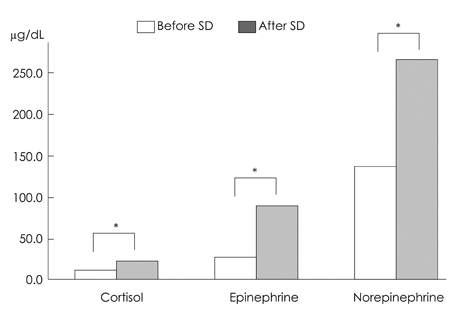J Clin Neurol.
2012 Jun;8(2):146-150.
Adverse Effects of 24 Hours of Sleep Deprivation on Cognition and Stress Hormones
- Affiliations
-
- 1Department of Neurology, Samsung Medical Center, Sungkyunkwan University School of Medicine, Seoul, Korea. smcsbhong@naver.com
Abstract
- BACKGROUND AND PURPOSE
The present study was designed to investigate whether 24 h of SD negatively affects the attention and working memory and increases the serum concentrations of stress hormones, glucose, and inflammatory markers.
METHODS
The acute effects of sleep deprivation (SD) on cognition and the stress hormones were evaluated in six healthy volunteers (all men, age 23-27 years). All were good sleepers, had no history of medical or neuropsychiatric diseases, and were not taking any kind of medication. All of the volunteers were subjected to the Continuous Performance Test (CPT) for attention and working memory of cognition and blood tests both before and after 24 h of SD. Electroencephalographic monitoring was performed during the study to confirm the wakefulness of the subjects.
RESULTS
SD significantly elevated the serum concentrations of stress hormones (cortisol, epinephrine, and norepinephrine), but serum levels of glucose and inflammatory markers were not changed compared to baseline. For easier steps of the CPT the subjects performed well in giving correct responses after SD; the correct response scores decreased only at the most difficult step of the CPT. However, the subjects performed consistently poor for the error responses at all steps after SD. There was no correlation between the CPT scores and stress hormone levels.
CONCLUSIONS
The 24 h of SD significantly heightened the levels of stress hormones and lowered attention and working memory. The acute SD condition seems to render the subject more susceptible to making errors.
Keyword
MeSH Terms
Figure
Reference
-
1. Nilsson JP, Söderström M, Karlsson AU, Lekander M, Akerstedt T, Lindroth NE, et al. Less effective executive functioning after one night's sleep deprivation. J Sleep Res. 2005. 14:1–6.
Article2. Adam M, Rétey JV, Khatami R, Landolt HP. Age-related changes in the time course of vigilant attention during 40 hours without sleep in men. Sleep. 2006. 29:55–57.
Article3. Leproult R, Copinschi G, Buxton O, Van Cauter E. Sleep loss results in an elevation of cortisol levels the next evening. Sleep. 1997. 20:865–870.4. Spiegel K, Leproult R, Van Cauter E. Impact of sleep debt on metabolic and endocrine function. Lancet. 1999. 354:1435–1439.
Article5. Ryu SY, Kwon MJ, Lee SB, Yang DW, Kim TW, Song IU, et al. Measurement of precuneal and hippocampal volumes using magnetic resonance volumetry in Alzheimer's disease. J Clin Neurol. 2010. 6:196–203.
Article6. Diamond DM, Fleshner M, Rose GM. Psychological stress repeatedly blocks hippocampal primed burst potentiation in behaving rats. Behav Brain Res. 1994. 62:1–9.
Article7. Conners CK. MHS Staff. Conners' Continuous Performance Test II: Computer Program for Windows Technical Guide and Software Manual. 2000. North Tonawanda, NY: Multi-Health Systems.8. Hoddes E, Zarcone V, Smythe H, Phillips R, Dement WC. Quantification of sleepiness: a new approach. Psychophysiology. 1973. 10:431–436.
Article9. Wilkinson RT. Sleep deprivation: performance tests for partial and selective sleep deprivation. Prog Clin Psychol. 1968. 8:28–43.10. Whitney P, Hinson JM. Measurement of cognition in studies of sleep deprivation. Prog Brain Res. 2010. 185:37–48.
Article11. Hagewoud R, Whitcomb SN, Heeringa AN, Havekes R, Koolhaas JM, Meerlo P. A time for learning and a time for sleep: the effect of sleep deprivation on contextual fear conditioning at different times of the day. Sleep. 2010. 33:1315–1322.
Article12. de Quervain DJ, Henke K, Aerni A, Treyer V, McGaugh JL, Berthold T, et al. Glucocorticoid-induced impairment of declarative memory retrieval is associated with reduced blood flow in the medial temporal lobe. Eur J Neurosci. 2003. 17:1296–1302.
Article13. Lupien SJ, Gillin CJ, Hauger RL. Working memory is more sensitive than declarative memory to the acute effects of corticosteroids: a dose-response study in humans. Behav Neurosci. 1999. 113:420–430.
Article14. Wolf OT, Convit A, McHugh PF, Kandil E, Thorn EL, De Santi S, et al. Cortisol differentially affects memory in young and elderly men. Behav Neurosci. 2001. 115:1002–1011.
Article15. Koenigs M, Holliday J, Solomon J, Grafman J. Left dorsomedial frontal brain damage is associated with insomnia. J Neurosci. 2010. 30:16041–16043.
Article16. Altena E, Vrenken H, Van Der Werf YD, van den Heuvel OA, Van Someren EJ. Reduced orbitofrontal and parietal gray matter in chronic insomnia: a voxel-based morphometric study. Biol Psychiatry. 2010. 67:182–185.
Article17. Gangwisch JE, Heymsfield SB, Boden-Albala B, Buijs RM, Kreier F, Pickering TG, et al. Sleep duration as a risk factor for diabetes incidence in a large U.S. sample. Sleep. 2007. 30:1667–1673.
Article18. Mallon L, Broman JE, Hetta J. High incidence of diabetes in men with sleep complaints or short sleep duration: a 12-year follow-up study of a middle-aged population. Diabetes Care. 2005. 28:2762–2767.
Article19. Schmid SM, Hallschmid M, Jauch-Chara K, Wilms B, Lehnert H, Born J, et al. Disturbed glucoregulatory response to food intake after moderate sleep restriction. Sleep. 2011. 34:371–377.
Article20. Mullington JM, Haack M, Toth M, Serrador JM, Meier-Ewert HK. Cardiovascular, inflammatory, and metabolic consequences of sleep deprivation. Prog Cardiovasc Dis. 2009. 51:294–302.
Article21. Knutson KL, Spiegel K, Penev P, Van Cauter E. The metabolic consequences of sleep deprivation. Sleep Med Rev. 2007. 11:163–178.
Article22. Frey DJ, Fleshner M, Wright KP Jr. The effects of 40 hours of total sleep deprivation on inflammatory markers in healthy young adults. Brain Behav Immun. 2007. 21:1050–1057.
Article
- Full Text Links
- Actions
-
Cited
- CITED
-
- Close
- Share
- Similar articles
-
- Appropriate Rest Time after Repetitive Sleep Deprivation Suppresses Apoptosis and Cell Proliferation in the Hippocampus
- Linalool Ameliorates Memory Loss and Behavioral Impairment Induced by REM-Sleep Deprivation through the Serotonergic Pathway
- Effects of Total Sleep Deprivation on Auditory Event-Related Potentials
- The Effects of Total Sleep Deprivation on Anxiety, Mood, Sleepiness and Fatigue
- Effects of Total Sleep Deprivation on Visual Discrimination



